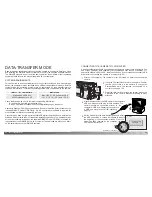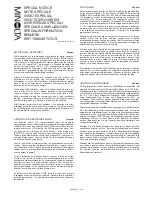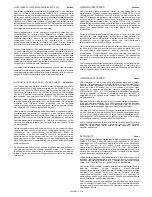
102
103
D
ATA
-
TRANSFER MODE
CHANGING THE COMPACTFLASH CARD - DATA-TRANSFER MODE
Windows 98 and 98 Second Edition
1. Turn off the camera.
2. Change the CompactFlash card.
3. Turn the mode dial to the data-transfer position to remake the USB connection.
Windows ME, 2000 professional, and XP
Macintosh
1. Stop the USB connection using the unplug-or-eject-hardware routine (p. 100).
2. Turn off the camera.
3. Change the CompactFlash card.
4. Turn the mode dial to the data-transfer position to remake the USB connection.
1. Stop the USB connection by dragging the drive icon into the trash (p. 101).
2. Turn off the camera.
3. Change the CompactFlash card.
4. Turn the mode dial to the data-transfer position to remake the USB connection.
AUTO POWER SAVE - DATA-TRANSFER MODE
If the camera does not receive a read or write command within ten minutes, it will shut
down to save power. When the camera shuts down, an unsafe-removal-of-device
warning may appear on the computer monitor. Click “OK.” Neither the camera or
computer will be damaged in this operation.
Turn off the camera with the mode dial. Remake the USB
connection by turning the mode dial back to the data-transfer
position.
Never remove a memory card when the access lamp is red - the data or
memory card may permanently be damaged.
QUICKTIME SYSTEM REQUIREMENTS
IBM PC / AT Compatible
Pentium-based computer
Windows 95, 98, 98SE, NT, Me,
or 2000 Professional.
32MB or more of RAM
Sound Blaster or compatible sound card
DirectX 3.0 or later recommended
QuickTime is used for viewing movie clips
and playing voice-memo audio files. To
install QuickTime, follow the instructions in
the installer. Macintosh users can download
the latest version of QuickTime free of
charge from the Apple Computer web site:
http://www.apple.com.
Problem
Symptom
Cause
Solution
The camera
will not work.
Nothing dis-
played on the
data panel or
the monitors.
The batteries are dead.
The batteries are inserted
incorrectly.
The AC adapter is not
connected properly.
Replace batteries (p. 16).
Reinsert the batteries taking
care that the negative and pos-
itive terminals are oriented as
indicated on the inside of the
battery chamber door (p.16).
Check that the adapter is con-
nected to the camera and a
live electrical outlet (p. 18).
The camera was accidentally turned on
while in a bag or case, or the lens was hin-
dered while extending.
Turn the camera off and on to
restore operation.
TROUBLESHOOTING
The section covers minor problems with basic camera operation. For major problems or
damage, or if a problem continues to reoccur frequently, contact a Minolta service facility
listed on the back cover of this manual.
Содержание DiMAGE S414
Страница 1: ...INSTRUCTION MANUAL E...






















